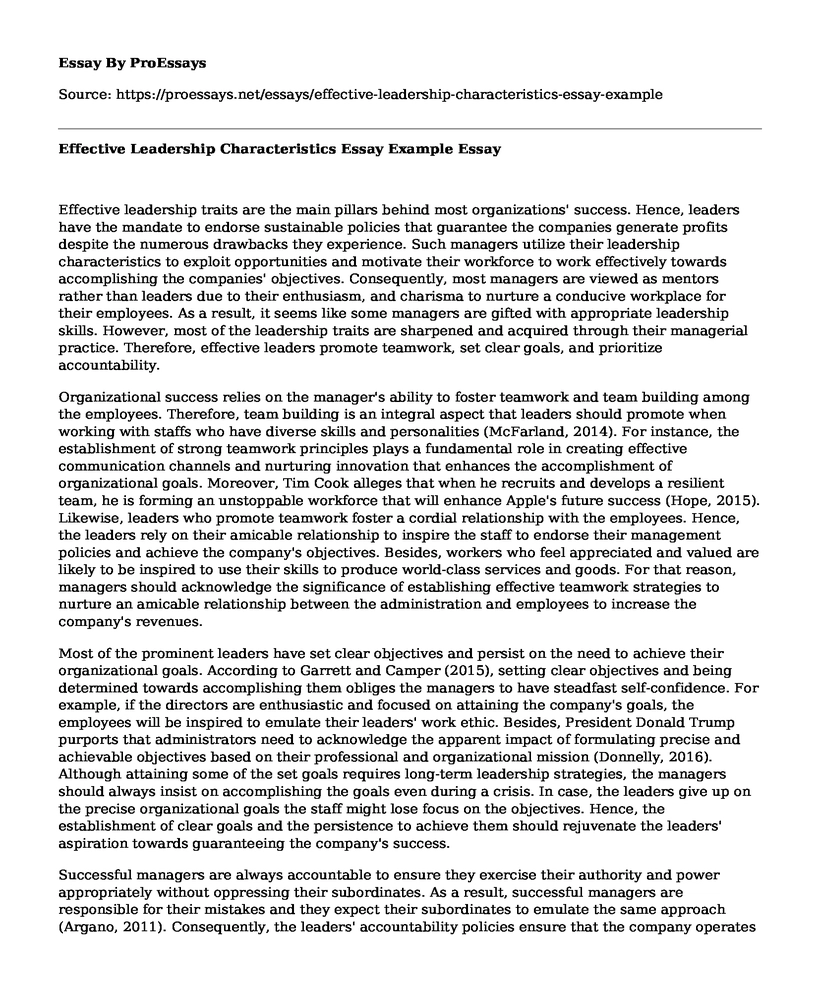Effective leadership traits are the main pillars behind most organizations' success. Hence, leaders have the mandate to endorse sustainable policies that guarantee the companies generate profits despite the numerous drawbacks they experience. Such managers utilize their leadership characteristics to exploit opportunities and motivate their workforce to work effectively towards accomplishing the companies' objectives. Consequently, most managers are viewed as mentors rather than leaders due to their enthusiasm, and charisma to nurture a conducive workplace for their employees. As a result, it seems like some managers are gifted with appropriate leadership skills. However, most of the leadership traits are sharpened and acquired through their managerial practice. Therefore, effective leaders promote teamwork, set clear goals, and prioritize accountability.
Organizational success relies on the manager's ability to foster teamwork and team building among the employees. Therefore, team building is an integral aspect that leaders should promote when working with staffs who have diverse skills and personalities (McFarland, 2014). For instance, the establishment of strong teamwork principles plays a fundamental role in creating effective communication channels and nurturing innovation that enhances the accomplishment of organizational goals. Moreover, Tim Cook alleges that when he recruits and develops a resilient team, he is forming an unstoppable workforce that will enhance Apple's future success (Hope, 2015). Likewise, leaders who promote teamwork foster a cordial relationship with the employees. Hence, the leaders rely on their amicable relationship to inspire the staff to endorse their management policies and achieve the company's objectives. Besides, workers who feel appreciated and valued are likely to be inspired to use their skills to produce world-class services and goods. For that reason, managers should acknowledge the significance of establishing effective teamwork strategies to nurture an amicable relationship between the administration and employees to increase the company's revenues.
Most of the prominent leaders have set clear objectives and persist on the need to achieve their organizational goals. According to Garrett and Camper (2015), setting clear objectives and being determined towards accomplishing them obliges the managers to have steadfast self-confidence. For example, if the directors are enthusiastic and focused on attaining the company's goals, the employees will be inspired to emulate their leaders' work ethic. Besides, President Donald Trump purports that administrators need to acknowledge the apparent impact of formulating precise and achievable objectives based on their professional and organizational mission (Donnelly, 2016). Although attaining some of the set goals requires long-term leadership strategies, the managers should always insist on accomplishing the goals even during a crisis. In case, the leaders give up on the precise organizational goals the staff might lose focus on the objectives. Hence, the establishment of clear goals and the persistence to achieve them should rejuvenate the leaders' aspiration towards guaranteeing the company's success.
Successful managers are always accountable to ensure they exercise their authority and power appropriately without oppressing their subordinates. As a result, successful managers are responsible for their mistakes and they expect their subordinates to emulate the same approach (Argano, 2011). Consequently, the leaders' accountability policies ensure that the company operates on particular procedures that lead to an efficient decision-making process. For instance, Jack Ma claims that responsible managers usually encourage and support individuality while evaluating the need to comply with his organizational policies (Uusiautti, 2015). As a result, accountable leaders are always aware of the need to balance their power and authority while implementing the most suitable organizational rules.
Conclusion
Effective leadership traits are some of the key pillars behind most company's prosperity. Therefore, the managers' traits play a crucial role in determining the most appropriate leadership styles that will be utilized to ensure that the organizational goals are accomplished. Consequently, most of the prominent managers set clear organizational objectives, prioritize accountability, and teamwork. For instance, teamwork nurtures diverse skills and personalities among the employees to form a resilient team that guarantees organizational success. Similarly, the managers should set precise and realistic objectives that should be upheld always to ensure the employees focus on attaining the set goals. Finally, effective leaders should be accountable for the approach they use to exercise their authority and power without oppressing their subordinates.
References
Argano, M. (2011). Leadership and commitment: the relationship between leaders' personality traits and organizational commitment. SSRN Electronic Journal. doi: 10.2139/ssrn.1992735
Donnelly, L. (2016). Aspirational characteristics for effective leadership of improvement teams. Pediatric Radiology, 47(1), 17-21. doi: 10.1007/s00247-016-3689-5
Garrett, J., & Camper, J. (2015). Formative assessment as an effective leadership learning tool. New Directions for Student Leadership, 2015(145), 97-106. doi: 10.1002/yd.20127
Hope, J. (2015). Prepare young leaders to be successful. The Successful Registrar, 15(4), 8-8. doi: 10.1002/tsr.30068
McFarland, V. (2014). Qualities in team development. SSRN Electronic Journal. doi: 10.2139/ssrn.2825837
Uusiautti, S. (2015). Success at work requires successful leaders? The elements of successful leadership according to leaders and employees of a Finnish mid-size enterprise. International Journal of Research Studies in Psychology, 4(3). doi: 10.5861/ijrsp.2015.1164
Cite this page
Effective Leadership Characteristics Essay Example. (2022, Oct 08). Retrieved from https://proessays.net/essays/effective-leadership-characteristics-essay-example
If you are the original author of this essay and no longer wish to have it published on the ProEssays website, please click below to request its removal:
- Information and Report on the Offshore Gas Reservoir in Kuwait
- Job Redesign Paper Example
- The Role of Innovation in Competitiveness and Economic Development
- Essay Sample on Strategic Management: Achieving Goals & Objectives for Optimal Performance
- Essay Example on Defining Organizational Behavior (OB)
- Leadership in Army: Impacting People & Achieving Goals - Essay Sample
- Research Paper on Creating Performance Excellence: HR's Role in Performance Management







